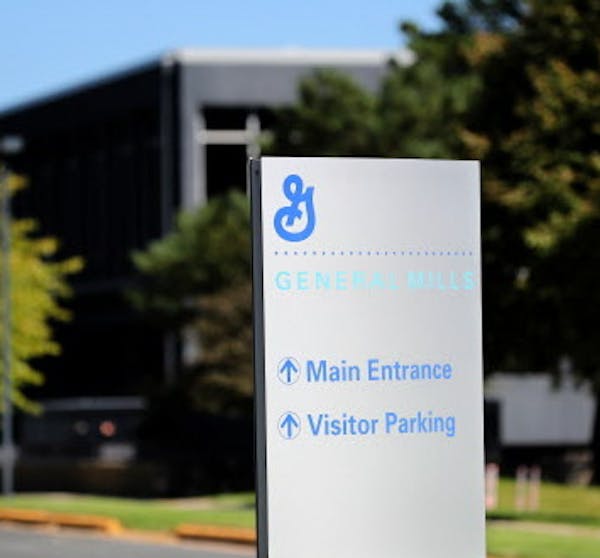General Mills Inc. on Friday took a surprising step back into pet food, a business it exited 50 years ago, by buying fast-growing Blue Buffalo Pet Products Co. for $8 billion in its second-biggest deal ever.
The purchase gives it a highly profitable company that, in the pet-food business, took advantage of some of the demand trends that General Mills has been catching up to in people food — more protein, simpler products and organic or natural ingredients.
General Mills is paying a high price. The deal valued Blue Buffalo at a 23 percent premium to its recent stock price and, as measured by a multiple of its profits, is well above the typical U.S. corporate acquisition.
Investors sent shares of Golden Valley-based General Mills down nearly 4 percent Friday and a ratings agency lowered its outlook on the company's debt, a portion of which will be used to finance the purchase.
Blue Buffalo will immediately boost General Mills' sales by nearly 10 percent and begin adding to its profits next year. The deal showed that, after just recently getting its sales growing again after two years of declines, General Mills executives are so eager to accelerate growth that they would enter a whole new business.
"We were looking for a company that was growing, that was purpose-driven, that would fit into the rest of our portfolio of brands, something that would be consistent with what we did," Jeff Harmening, chief executive of General Mills, said in an interview. "Blue Buffalo fit all those criteria."
Blue Buffalo Pet Products, started in 2002 by a family that grew concerned about pet food after a family dog got cancer, has grown to a $1.2 billion seller of pet food that is billed as more wholesome and commands premium prices. In commercials, it contrasts the simple ingredients in its foods with the grains and fillers in other pet foods.
"Everybody is wanting to feed better quality foods for all of their family members," said Billy Bishop, the chief executive of Blue Buffalo and a co-founder with his father and brother. They named the company after the family dog at the time, Blue.
Blue Buffalo is still in a period of very fast growth. It reported 2017 sales growth of 11 percent and expects another double-digit increase this year. Its full-year adjusted profit grew 25 percent.
In an interview, Bishop said the family was focused on running the business when Harmening called. He said they quickly hit it off.
"Being a consumer myself, I love Annie's, love Larabar, love Epic," Bishop said, referring to some of the product brands General Mills has acquired in recent years. "To be able to work with one of the country's largest natural and organic companies, with expertise in so many areas like R&D, supply chain, these are the right core competencies to help Blue Buffalo recognize its vision to feed as many pets as we can."
Bishop will continue to lead the business, which will keep its main office in Wilton, Conn., and production facilities in Missouri and Indiana. General Mills made similar arrangements with founders of other companies it bought, including Annie's and Epic.
Harmening said Blue Buffalo's financial performance appealed to General Mills but so did the broader opportunity in pet food. Pet food prices and sales have risen faster than people food as consumers started paying more attention to ingredients and quality. And young adults tend to spend more on their pets.
"There's a great deal of emotional appeal in the industry," Harmening told investors and analysts on a conference call. "Pets are beloved members of the family, and consumers want the best for them."
The Blue Buffalo deal is second to General Mills' acquisition of Pillsbury for $10.5 billion in 2000. Its biggest deal in recent years was the $820 million purchase in 2014 of Annie's Inc., a California-based maker of organic pastas and other products.
The deal is the eighth-largest by a Minnesota-based company and the largest since UnitedHealth Group in 2015 paid $12.8 billion for Catamaran, a pharmacy benefits management firm.
General Mills is paying about 25 times the value of Blue Buffalo's earnings before taxes and other costs, which is well above the 16.5 times multiple that is average for corporate acquisitions.
"We like the strategic merit. But the price is steep, and General Mills will have to work hard to extract value from the deal," Akshay Jagdale, analyst at Jeffries, wrote in a note.
Kevin Ellich, a senior research analyst with Craig-Hallum Capital Group in Minneapolis, said pet food spending increases are being driven by younger adults. "Blue Buffalo is considered a premium dog food, and it's a healthier all-natural option," Ellich said. "We've seen that shift with millennials who are spending more money so their pets can eat like they do, natural and organic."
General Mills first sold pet food in the 1930s, when it expanded a business it had that sold feed for farm animals. In 1959, the company acquired the American Crab Meat Co., the Boston-based maker of "3 Little Kittens," a line of canned cat food made from fish. It left the business in the 1960s, however.
Separately, Pillsbury owned the Alpo brand for many years but sold it in the 1990s before the company was purchased by General Mills.
"Some people might think that pet food is far away from what we do, but actually it's pretty close," Harmening said. "The trends are the same. The underlying technology is the same.
"We have been serving family members foods they love for 150 years," he added. "And now, we're just expanding that to furry family members. Pets are undeniably part of the family."
Staff writer Jackie Crosby contributed to this report.
Evan Ramstad • 612-673-4241
